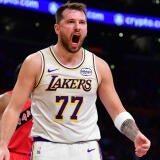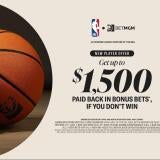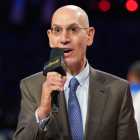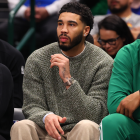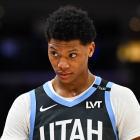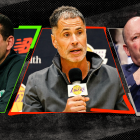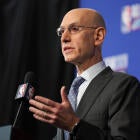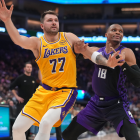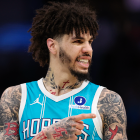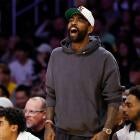Lakers-Warriors preview: Five biggest questions -- about matchups, mismatches, more -- for star-studded series
These are the stories to watch as the Lakers and LeBron face the Warriors and Steph
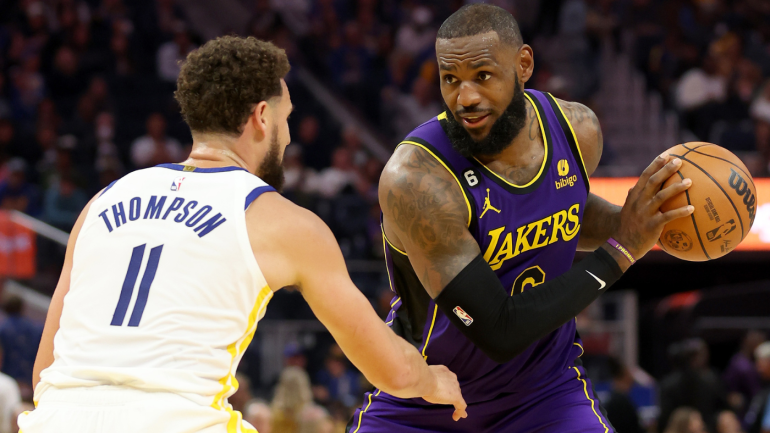
The Lakers would never admit it, but they were probably a bit disappointed with the ending of the first-round series between the Warriors and Kings. Sacramento would've been a formidable opponent, but one this Lakers roster is tailor-made to bludgeon. The Kings would have had no way of keeping Anthony Davis away from the basket and an endless array of small guards for LeBron James to switch-hunt. The Warriors struggle with small, speedy guards, so De'Aaron Fox gave them fits. The Lakers just spent six games throttling a better one in Ja Morant. There's no such thing as an easy second-round opponent, but the Kings were certainly the desirable one for a Lakers team that is very much still finding itself after being remade in February.
The Warriors present a different set of problems, and they are far less forgiving of growing pains than the Grizzlies were. Golden State's frenetic ball-movement and precise cutting forces defenses to play on a string. Flawed as their defense is against guards, it has quite a bit of optionality against forwards and big men. The Warriors are perhaps the most dangerous 44-win team the postseason has ever produced.
Of course, it could be argued that the Lakers are, in turn, the best 43-win team that the playoffs have ever seen. This series has five Hall of Fame players. The leaders of the two sides have combined to win eight of the past 12 championships. Those regular-season records are ultimately meaningless. This is going to be a war. So with Lakers vs. Warriors looming, let's look at the key battlegrounds on which this series will be decided.
1. Who's tracking Steph?
The Lakers have to completely rewire their brains defensively between their first-round series and this one. Ja Morant gets scarier the closer he is to the basket. Stephen Curry gets scarier the further away he floats from it. Guarding him is a full-time job. Doing it right usually means full-time face-guarding and frequent help if not outright switching. The latter is inevitability the Lakers will try to avoid as much as possible. When possible, the goal will be to assign two defenders Curry duty across his 40 or so minutes of playing time.
Jarred Vanderbilt is almost certain to start the series on Curry. It's an unorthodox assignment for a 6-foot-8 center, but it's how the Lakers approached Morant and it's how they've handled most star guards since the trade deadline. Vanderbilt's track record with Curry, specifically, is limited but promising. He guarded him for most of a 2022 game as a member of the Minnesota Timberwolves and proved comfortable tracking him both on-ball...
And off of it...
The Laker Darvin Ham has preferred to use on Curry this season has been Dennis Schroder. It's a high-risk, high-reward job for the best full-court pest the Lakers have. Schroder is quick enough to change directions with Curry and small enough to sneak over most screens when he knows they're coming. He's deceptively physical for a defender of his size as well. But his effort is pretty inconsistent. Batter him with a strong enough screen or fool him with a fake and he too frequently gives up on the play.
The Lakers need the version of Schroder that looks a bit more like this, one who chases Curry and defends him with discipline.
Regular-season tape isn't an ideal source of intel here. Schroder was starting at point guard when he last faced Curry. He's a full-time reserve now with less on his plate offensively. If Ham puts him on Curry, it will be with the understanding that most of his energy should be devoted to defense. If he and Vanderbilt face Curry with this sort of energy, they'll at least be able to make him work. That's the best you can reasonably hope for against a player of his caliber, and don't be surprised to see the Lakers throw some help in his direction.
The Lakers played most of their series against the Grizzlies in drop-coverage. This is the most basic form of pick-and-roll coverage: drop the screener's man into the paint and deny the rim. They toyed with a slightly more aggressive hedge-and-recover approach in Game 6 that showed promise.
Was this an experiment they planned to unleash on Golden State? To some extent, sure, but the Warriors are a far deadlier half-court opponent. The 3-pointers generated on these looks are scarier coming out of Klay Thompson's hands, and Draymond Green is so experienced generating shots out of 4-on-3's that the Lakers would have to recover flawlessly for this scheme to work. They did so during the 2020 bubble, but not against anyone as dangerous as Curry.
This will be one of the early battlegrounds of the series. The Lakers will spend the early games concocting ways of preventing Curry from shooting. If the Warriors can punish them for it, they'll control the terms of engagement moving forward. But between Green, Kevon Looney and Gary Payton II, Golden State has just enough non-shooters to make the Lakers comfortably playing the rotation game.
2. Who wins the slugfest around the basket?
If there was one play that embodied the sort of series Domantas Sabonis just endured against Golden State, it came on a jump ball in the second quarter of Game 6. Kevon Looney somehow managed to elbow Sabonis in the face. He writhed on the ground in pain and played the rest of the game with a noticeable bruise under his eye. No foul call.
Watch Looney play off-ball defense for any significant stretch and you'll see what Sabonis went through. He is as physical as the officials allow him to be, and once he knows he's not going to get whistled, he'll absolutely maul his opponents under the rim. Sabonis got bullied. Davis won't. It's not a matter of strength, though Davis is far more physically imposing than Sabonis. It's a simple case of one player getting a star whistle and the other not. If you yank Anthony Davis' arm under the basket, the officials are going to notice. There's a reason the Lakers shot the most free throws in the NBA this season.
A more generous whistle levels the playing field for what should be one of the best individual matchups of the series. Anthony Davis is the postseason leader in defensive rebounding, pulling in 10.7 of them per game. Looney just won Golden State Game 7 against Sacramento by racking up 10 offensive rebounds. He's averaging 5.3 of them per game in the postseason. The two of them are probably going to be matched up against one another for most of this series. Looney was Golden State's primary Davis defender this season, taking him for 32 field goal attempts compared to 19 for Green.
Yet the Green matchup is likely the more strategically relevant. Green is the best defensive player of his generation, yet no opposing big man has ever vexed him quite like Davis has. When the two met in the 2015 playoffs, Davis averaged 31.5 points on 54% shooting. For his career, Davis actually averages more points against Green (24.7) than he does against all other opponents (24). The explanation for why is simple. Cue up your Plankton memes: Draymond is small.
Other than Ben Wallace and Bill Russell, no post-defender has ever had as much success against bigger scorers than Green. He is so strong and has such a low center of gravity that he practically never surrenders ground to opponents. But he's 6-foot-6 with a 7-foot-1 wingspan. Davis is four inches taller and his wingspan is five inches longer. When Davis elevates for a hook or a runner, Green simply isn't big enough to consistently contest it without fouling.
This is critical because small-ball is going to be Golden State's simplest path to late-game offense. The Lakers are comfortable playing big or small, and even when they put three guards on the floor with James and Davis, their two superstars are physically gifted enough to survive on the glass without much help. But when things get tight and their beautiful game is disrupted by the realities of crunch time, can the Warriors generate good shots with two big men on the floor? The evidence suggests it will be difficult. The Warriors ranked 24th in clutch offense this season, and though it's a tiny sample, their 105.4 clutch offensive rating against Sacramento leaves much to be desired.
The Warriors will go small when they need to go small. Steve Kerr isn't afraid to throw Green on anyone, Davis included. But that's a matchup the Lakers can live with. There will be games in this series decided by what happens when the Lakers throw the ball into Davis two or three times in the closing minutes.
3. Is Russell ready for the moment?
Sort of suspicious that we're more than 1,500 words into this preview and we haven't mentioned LeBron James in more than passing, right? Well... he was suspiciously quiet in the first round. The player Golden State is facing now isn't the same player they faced the last time they saw James in the playoffs.
James took only 14 total shots out of isolation against the Grizzlies. That's an average of 2.3 per game. In the 2018 postseason, he took nearly four times as many: 8.3 per night. The differences were almost as stark in other play types typically associated with high-usage ball-handlers. James took just 13 shots out of pick-and-roll against the Grizzlies, or 2.2 per game. He was at around 5.5 in the 2018 playoffs. Only seven Lakers possessions per game in the first round ended with a James pick-and-roll against Memphis, if you include passes. He was at 14.7 in 2018.
We can chalk this up to a number of factors. James is old. He's playing on one foot right now. Even four months ago, the idea of James struggling to get by Xaxier Tillman was laughable. But scheme and matchups dictated LeBron's decision-making as well. the best play in the Laker playbook is the simplest: a spread pick-and-roll between James and Davis. It was essentially absent against the Grizzlies because Memphis could just switch it. Dillon Brooks isn't an ideal Davis matchup, but he can hold his own long enough for the defense to reorient itself. The same is going to be true against Golden State. Andrew Wiggins will likely be Golden State's primary James defender, and while he would struggle with Davis, the Warriors would just send help, force the ball to move and scramble back into position.
The Lakers found a number of ways of keeping James involved against Memphis, but the bulk of their pick-and-roll offense ran through D'Angelo Russell. Wiggins on Davis is a mismatch. A guard on Davis is a death sentence. Even the switch-happy Warriors wouldn't dare let Klay Thompson or Stephen Curry try their luck with The Brow, so switching is likely off the table at least while the starters are on the floor.
On paper, that leaves a number of less-than-stellar options. Duck under screens and Russell will gladly take pull-up 3's. He's no Curry, but he'll make them often enough to make going under a losing proposition. So the Grizzlies largely opted to chase him over screens while dropping their big man into the paint. That frequently left him sandwiched between two defenders. That's not really an issue for Russell. He once made an All-Star team on the back of his floater.
The best version of Russell punishes whatever defense the Warriors throw at him. Blitz and the Lakers, with above-average passers at every position, just find the open cutter moving toward the rim. Switch and you sacrifice two undesirable matchups. This is the player the Lakers hoped they'd get when they traded for Russell in February: a scheme-proof secondary ball-handler that could function anywhere with an offense.
The reality of Russell is pretty uneven. He shot below 36% from the floor in his first two career playoff series, neither of which came with the Lakers. He was again in that range through five games against Memphis before a 31-point Game 6 explosion saved his averages. Russell had his share of big moments against the Grizzlies. The Lakers would have lost Game 4 without his three fourth-quarter 3-pointers. They also lost Game 2 in part because of how aggressively Desmond Bane hunted him defensively down the stretch. The theoretical version of Russell tends to show up once per week. The rest of the time? He's a mystery box.
That's not going to be enough against the Warriors if James is still hobbled. Golden State's guard defenders are vulnerable, as Sacramento just proved. Austin Reaves can exploit that in bits and pieces, but Russell is this offense's point guard right now. If he doesn't act like it, the Lakers will not be able to score on Golden State.
4. When do the rotations trim?
The series hasn't even started yet and the Lakers have already picked up its first win. They finished off Memphis in six games. Golden State needed seven to eliminate the Kings. That gave the Lakers two extra days of rest. That's meaningful in itself—the Warriors were 7-13 with a rest disadvantage this season—but it's even more important in the context of the second-round schedule. There are no extended breaks in this series. Starting Tuesday, the Lakers and Warriors will play every other day until one of them is eliminated.
These are not young teams. All five Hall of Famers we'll see in this series are in their 30's. Playoff games are taxing. This series is going to be a war of attrition, and that's going to mean deep rotations to start things off. The Lakers will almost certainly use Troy Brown Jr. and either Malik Beasley or Lonnie Walker IV for real stretches early on. The Warriors will probably have to go back to Jonathan Kuminga for the time being.
We've already seen what a do-or-die rotation looks like out of Golden State. Payton and Jordan Poole will be mainstays, and for now, it seems as though Moses Moody has edged out Donte DiVincenzo for the eighth slot. Things are murkier for the Lakers. They rely heavily on seven players: James, Davis, Russell, Reaves, Vanderbilt, Schroder and Rui Hachimura. Don't be surprised if No. 8 is someone we didn't see much of in the first round: Wenyen Gabriel. The Lakers elected not to use a backup center against the Grizzlies because Memphis was so thin up front that they didn't believe they'd be punished for it. After what Looney just did to the Kings, Ham might not be so eager to sacrifice the glass for the sake of spacing in his bench lineups.
Every minute is going to count in this series. The longer Ham and Kerr can avoid going all-in on their starters, the more rested those starters will be as the series progresses. From that perspective, Game 1 is probably the most important of the entire series. The Lakers have a golden opportunity to punish an exhausted Warriors team and steal home-court advantage right away. They'll never have a better chance to win in San Francisco because the Warriors almost certainly can't prioritize Game 1. They're going to be too tired to do so.
5. Where are the hiding spots?
Who are the point guards going to defend in this series? There's no good answer for either side. The Lakers have three relative certainties in how they'll initially align their defense. Davis will guard Looney so that he is free to provide help elsewhere, much as he did while guarding Tillman against Memphis. Vanderbilt will chase Curry, and Reaves will do the same to Klay Thompson. That leaves James and Russell to defend Green and Wiggins.
In the NBA Finals, we frequently knew that the Cavaliers were ready to start taking things seriously as soon as James started defending Green. While Green isn't a scoring threat on his own, he's Golden State's functional point guard on offense and is involved in virtually all of their pick-and-roll and handoff actions. Defending Green means defending Golden State's favorite kinds of offense and frequently either helping on their shooters or switching onto them outright. When things get serious, James will do that. But that leaves Russell in a mismatch with Wiggins, who would bully him in the post and fire jumpers right over his head. Is that a sacrifice the Lakers are willing to make? Possibly. After all, even a mismatched Wiggins shot is probably a better outcome for the Lakers than leaving the offense in Curry's hands.
The Warriors are a bit more flexible in how they'll align. Curry won't take James or Davis for obvious reasons. They could stick him on Vanderbilt for the lowest-impact job on the court, but that would mean sacrificing a ton of offensive rebounds. Besides, the Warriors typically prefer using Green on such players for the same reasons the Lakers use Davis on them: help-defense. Russell is probably a no-go as well. The best way to slow Curry down on offense is to make him work on defense. James Harden was a master at this, switch-hunting him relentlessly just to tire him out. James used to do it a fair bit as well, and he surely will in high-leverage possessions, but it's something the Warriors have gotten better at avoiding. Frankly, the Lakers don't shoot well enough to warrant automatic switching.
That probably leaves Reaves, which comes with its own risk: foul trouble. Reaves is a master foul grifter, especially in mid-range. If he can get Curry on his back chasing him around screens he'll just jump into him and hoist up a shot. He averaged almost seven free throws per game from March 1 on doing just that.
Both sides can complicate the matchup game by going small. In fact, if Schroder defends Curry well in the early games, it might be worthwhile for Ham to start him later in the series. Doing so forces Green to defend a real scorer attentively, which in turn opens up offense for everyone else. Kerr started Poole over Green twice against Sacramento to maximize spacing. The last thing the Lakers want is for James to tire himself out defending in space, or for the Warriors to be able to hunt Russell there. Hachimura is another prime target for Golden State's guards on a properly spaced floor.
There's no way to remove key offensive players from the defensive equation entirely. The Warriors wouldn't even if they could. Curry is an impactful defender even if his energy is better spent elsewhere. But neither the Lakers nor the Warriors want their ball-handlers working too hard on that end of the floor. That's going to force both sides to be careful about how many non-shooters they leave on the floor. Payton is a particularly risky bet here. As valuable as his defense is, Russell is not Fox. Golden State is not so desperate to slow him down that they should ignore what Payton takes off of the table offensively.
These are the sort of adjustments Kerr and Ham are going to have to figure out as the series progresses. Curry and James are the headliners here, but both of these rosters are deceptively flexible. The basketball we see in Game 1 will likely be unrecognizable by the time we get to Game 5. Buckle up, folks. One of the best series of the postseason is about to begin.


